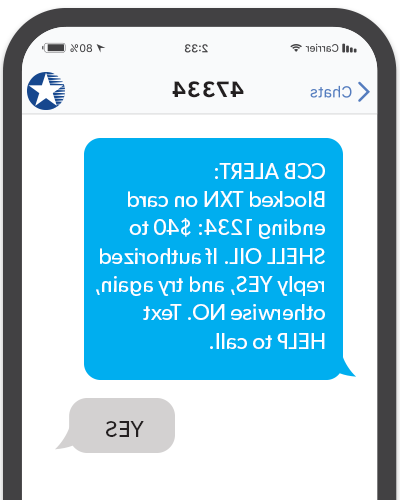

您的买世界杯app推荐信息的安全性和保密性对我们非常重要. 这就是为什么世界杯app软件推荐永远不会打电话来, 给你发短信或发电子邮件,询问你的借记卡密码或网上银行密码,以验证或验证你的身份. 事实上,这是没有正当理由的 任何 金融机构永远不会需要你的借记卡密码或网上银行密码. 另一方面,对于骗子来说,这是他们所追求的发薪日.
最安全的选择, 如果你曾经被联系并被要求提供敏感的账户或买世界杯app推荐信息, 总是要挂电话直接打电话给我们核实吗, 除非是你主动联系的,或者你能确定联系你的人的合法性. 万一你接到可疑电话, 短信或电子邮件, 或者注意到您在网上银行交易列表中没有识别的活动, 我们的银行家会立即采取行动,保护您和您的账户免受进一步的风险.
呼叫。 888.671.0400 每周7天,每天24小时与我们的欺诈保护服务部联系.
发卡服务时间:
- 周一至周五上午8点.m. 直到晚上9点.m., ET
- 星期六9点.m. 直到下午4点.m., ET
- 星期日下午1 - 4点.m., ET
- 如在信用卡服务时间以外致电, 一个块将立即放置在您的卡上,以阻止所有未来的交易.
保护自己免受欺诈访问我们的 诈骗警报中心 常见的危险信号,以帮助您发现和避免所有最新的骗局.
- 登录您的网上银行服务或ccb移动应用程序.
- 在主菜单下,单击 服务 然后 借记卡服务.
- 在下拉框中选择受影响的借记卡,单击 冻结信用卡.
- 对打电话的人保持警惕, 给你发电子邮件或短信,要求你提供网上银行的用户名或密码, 或者任何与你账户相关的号码, 借记卡和买世界杯app推荐身份, 即使他们声称是从你的银行打来的. 不要提供任何买世界杯app推荐信息,并立即联系我们报告事件.
- 每月检查你的首都城市银行对账单,确保它们与你的记录相符.
- 在丢弃之前撕碎所有买世界杯app推荐和财务信息.
- 不要在自动取款机或银行柜台留下收据.
- 及时将邮件从邮箱中取出,并将寄出的邮件存放在邮局.
- 每年检查你的信用报告. 您有权每年获得一份免费的信用报告.
- 在您的网上银行服务中设置帐户警报,以便在发生指定交易和安全事件时接收实时通知.
利用你的手机和电子邮件来对抗借记卡欺诈!

- 打电话给我们.
- 和我们聊天.
- 登录您的网上银行服务或ccb移动应用程序. 从主菜单中选择 服务 > Update 联系 Information 以验证您的移动电话号码列在“手机”字段中, 在“电子邮件”字段中输入电子邮件地址, 或更新或添加手机号码或电子邮件到您的帐户.
充分利用欺诈保护服务
使用借记卡时的干扰:
- 总是使用电子芯片而不是磁条——电子芯片是
更安全,更不容易被标记. - 当你用信用卡购物时,总是把你的手机放在手边,这样你就可以
接收并回应我们可能发送的任何警报. - 尽快回复以避免任何借记卡使用中断. 然而,
您可以在收到警报后72小时内作出回应. 如果时间超过72
请联系您的银行或我们的客户服务中心寻求帮助. - 旅行时,最好提前通知你的金融机构
你会在你正常使用的区域之外使用你的借记卡. 此外,
请记住,欺诈警报依赖于短信和电话访问,所以考虑一个
国际电话计划时,出国旅行,以确保您能够收到
回复短信和电话提醒.
世界杯app软件推荐制定了欺诈规则,以保护我们的客户和银行. 客户端能够指示, 通过文本回复, 不管他们最近有没有做过交易, 允许更多地控制借记卡上的交易.
当可疑交易被标记时, 当怀疑欺诈或可能的欺诈活动时,Capital City会发送短信和电子邮件警报. 拥有当前手机号码的客户将实时收到发送者发送的SMS文本信息 47334.
取决于手头的情况, 您将收到一个文本和/或电子邮件,说明您的交易尝试被阻止或可能发生了未经授权的交易.
- 阻塞事务,回答“是”并再次尝试购买. 或者,回答NO,如果你没有授权交易,让我们知道这是欺诈.
- 可能的未经授权交易,你只需回答YES或NO. 剩下的我们来处理. 在某些情况下,您的卡可能会暂时停用. 一旦您回答“是”,您的卡将被重新激活.
- 如果活动是未经授权的、回复 NO 让我们知道这是欺诈, 我们会立即停用您的借记卡以阻止未来的欺诈交易.
- 如果您不希望收到有关涉嫌财务或身份欺诈事件的警报, 您可以随时取消短信服务. 文本停止响应任何警报从您的移动设备或通过短信停止到47334. 没有手机记录的客户, 或者选择退出短信提醒将收到866的电话通知.446.1415来验证事务. 存档的手机和电子邮件信息是最新和准确的,这一点非常重要.
- 通过向CCBG发送短信至47334,选择返回诈骗短信警报.
- 为什么? 窃贼将偷来的信用卡放入数字钱包是很常见的, 所以为了保护你,我们想验证一下.
- 接下来是什么? 如果你把你的借记卡添加到数字钱包里, 对收到的提醒回复“是”,继续使用您的卡,不会中断.
- 为什么? 因为一旦预授权结束,实际费用就会被评估. 在预授权时提示您进行验证可以让我们与您进行确认 之前 所有的钱都离开你的账户.
- 接下来是什么? 如果您确实尝试在线支付或在列出的商家购买, 回答“是”,即可继续使用您的信用卡.
如果我们标记可疑交易, 在收到您的消息之前,我们将采取以下两种措施之一来保护您的帐户. 所有欺诈警报都需要快速回复YES或NO, 我们的系统会立即处理您的回复,所以只需要几秒钟.
以下是您可能收到的CCB警报类型以及如何响应:
| 可疑交易在购买点被阻止... |
你会立即收到短信或电话. 回答是的 授权交易并重试购买. 没有回应 确认欺诈,我们会回复一个电话号码以寻求额外帮助. |
| 在发生可疑交易后,借记卡会被暂停,以防万一... |
你会收到短信或电话. 回答是的 验证交易并立即重新激活您的卡. 没有回应 确认欺诈,我们会回复一个电话号码以寻求额外帮助. |
| DO | 不 |
|---|---|
|
|
